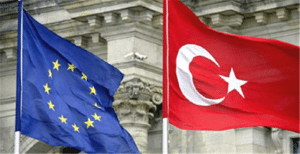Call for Papers: Interdisciplinary Workshop “Turkey and the European: rethinking a multifaceted relationship” by Tilburg University
December 15, 2011 by Changing Turkey

Contact and abstract submission: turkey-eu@uvt.nl
Important dates
Deadline for submission of abstracts: 5 March 2012
List of participants finalised: April 2012
Extended abstract submission: June 2012
Paper submission: August 2012
Convenors
Firat Cengiz, Tilburg University, f.cengiz@uvt.nl
Lars Hoffmann, Maastricht University, lars.hoffmann@maastrichtuniversity.nl
Background
It has been almost 50 years since the European Economic Community and Turkey signed the Ankara Association Agreement that was supposed to pave the way to full Turkish membership to today’s EU. Yet, Turkey’s candidate status for membership was approved finally in 1999 and accession negotiations started only in 2005. Moreover, soon after the negotiations faced a stalemate due to Turkey’s refusal to extend the Turkish-EU customs union to the Republic of Cyprus and the EU’s resulting refusal to negotiate accession chapters with regard to internal market. Recent policy developments imply that if Turkish accession is taken seriously, the EU needs to find new strategies to re-energise the accession talks.
Turkey’s role as a Muslim ‘leader of democracy’ renders her a natural partner to western forces to speak to the increasingly western-sceptic peoples of the Middle East, particularly in the wake of the Arab Spring. Likewise, due to its geopolitical position Turkey is seen an indispensible partner for European energy security. The EU Commissioner for Enlargement, Štefan Fühle, speaking on Turkish-EU relations, pointed out that ‘the EU has…repeatedly underlined the importance of progress in the normalisation of relations between Turkey and all European Union Member States, including the Republic of Cyprus’.
Nevertheless, there are significant reasons to doubt whether it is realistic to expect a revitalisation in Turkish-EU relations in the near future. The AKP government in Turkey is going through a confidence boost due to Turkey’s impressive economic performance as the world 17th economy and the party’s recent third consecutive election victory. Consequently, the Turkish government perceives its relationship with the EU more and more as one between equals. This perception does not sit comfortably with the regular dynamics of accession. Likewise, although the EU has been ‘a vocal and often successful advocate for democratization’ in candidate countries (Kubicek 2011), it seem to have lost its leverage over the Turkish political system as illustrated in the 2010 constitutional reform experience. Finally, a number of EU Member States, most notably Austria, France and Germany, remain sceptical of Turkish EU membership due to sociopolitical reasons and campaign for an alternative privileged association framework.
In the midst of these centripetal and centrifugal forces in Turkish-EU relations, we aim to take stock of the Turkish enlargement process and shine such-needed light on different aspects of Turkish accession. In previous accession negotiations the EU has been both ‘the main catalyst and constraining factor’ in regional integration (Bechev 2006). On this basis we aim to disentangle the Turkish-EU relations to detect what both sides can gain from accession and what reform steps have to be taken – both in Ankara and Brussels – to revitalise the Turkish accession talks.
Specific Topics and Questions (non-exclusive)
* Turkey’s regional role: is Turkey’s emerging regional leadership complementary or alternative to its half a century old objective of EU membership? Given this position, what kind of extra incentives can be offered to secure continuing Turkish commitment to EU membership?
* Benefits for the EU Member States: why should Turkish membership matter to the EU and its Member States? Given socio-political cost-benefit structures of both sides how can the sceptical EU Member States be convinced to commit to Turkish membership?
*Cyprus: the Cypriot conflict constitutes the ‘official’ reason for the stalemate in accession negotiations. Given the wide gap between the official position of Turkey in this matter vis-à-vis that of the EU, what kind of short- and medium-term strategies can be offered for the resolution of the current stalemate? Can progress be made in accession talks without the resolution of the Cypriot conflict?
*Democratic conditionality: given the current movement towards authoritarian government and governance in Turkey and despite the stalemate in accession talks, does the EU still enjoy credible leverage with regards the Turkish constitutional reform process? What kind of ‘anchor’ role – if any – can the EU perform concerning issues such as minority protection, electoral fairness, and freedom of expression?
*The Kurdish issue: after the 2011 elections disturbing events took place that increasingly threatened the resolution of the Kurdish issue through democratic methods. What kind of role – if any – can the EU institutions play in securing a return to political talks with the aim to achieve a peaceful and sustainable solution to the Kurdish conflict?
*The role of civil society: EU institutions do not directly engage with civil society in accession countries, apart from operating financial support programs, such as PHARE. Likewise, the Europeanisation literature largely rules out the effectiveness of ‘socialisation’ as a method of integration. However, in the Turkish case, where the process suffers from a lack of commitment from both sides, can civil society constitute a viable partner for the EU to achieve a sustained commitment to Turkish membership? If so, what kind of strategies can the EU institutions adopt for building such a partnership?
Workshop format
The workshop will take place on 21 September 2012. It will be a one-day
workshop with a keynote speech and three panels. We anticipate three papers per panel, as well as a chair and a discussant. We aim to foster debate among the different paper-givers throughout the day, though the workshop will be open to the public.
Output
We aim to publish papers as an edited volume and/or a special journal issue. We contacted international publishing houses and received positive initial responses. After full-length papers are submitted a definitive decision will be taken with regard to the outlet of publication.
Reimbursement policy
Funding for economy travel and accommodation costs (up to two nights in
Tilburg) of speakers may be available.